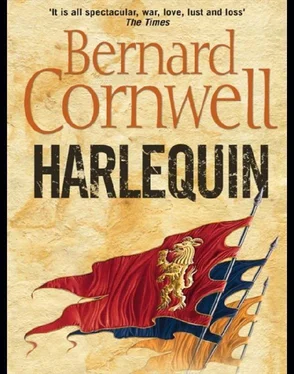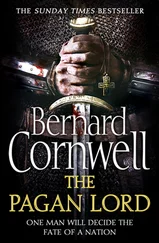Get on with it," Thomas said, then took himself to the end of the village where there was a small wooden church which had been pushed by the wind into a permanently lopsided stance. The church was little more than a shed, maybe it was a shrine to some saint of this misbegotten marshland, but Thomas reckoned the wooden structure would just about bear his weight so he scrambled off the horse onto the moss-thick thatch and then crawled up to the ridge where he clung to the nailed cross that decorated one gable. He saw no movement in the marshes, though he could see the smear of smoke coming from the French campfires that misted the fading light north of Abbeville. Tomorrow, he thought, the French would cross the bridge and file through the town's gates to confront the English army whose fires burned to the south, and the size of the smoke plumes witnessed how much larger the French army was than the English.
Jake appeared from a nearby cottage with a sack in his hand. What is it?" Thomas called.
Grain!“ Jake hefted the sack. Bloody damp. Sprouting.” No eels?"
Of course there are no bloody eels,“ Jake grumbled. Bloody eels got more sense than to live in a hovel like this.” Thomas grinned and looked off to the sea that lay like a blood-reddened swordblade to the west. There was one distant sail, a speck of white, on the clouded horizon. Gulls wheeled and soared above the river that here was a great wide channel, broken by reeds and banks, sliding towards the sea. It was hard to distinguish between river and marsh, so tangled was the landscape. Then Thomas wondered why the gulls were screaming and diving. He stared at them and saw what at first looked like a dozen cattle on the riverbank. He opened his mouth to call that news to Jake, then he saw that there were men with the cattle. Men and women, perhaps a score of them? He frowned, staring, realizing that the folk must have come from this village. They had presumably seen the English archers approaching and they had fled with their live-stock, but to where? The marsh? That was sensible, for the wetlands probably had a score of secret paths where folk could hide, but why had they risked going onto the sand ridge where Thomas could see them? Then he saw that they were not trying to hide, but to escape, for the villagers were now wading across the wide waters towards the northern bank.
Sweet Jesus, he thought, but there was a ford! He stared, not daring to believe his own eyes, but the folk were forging steadily across the river and dragging their cows with them. It was a deep ford, and he guessed it could only be crossed at low tide, but it was there. Jake!“ he shouted. Jake!”
Jake ran across to the church and Thomas leaned far down and hauled him onto the rotting thatch. The building swayed perilously under their weight as Jake scrambled to the ridge, took hold of the sun-bleached wooden cross and looked where Thomas was pointing.
God's arse,“ he said, there's a bloody ford!” And there are bloody Frenchmen," Thomas said, for on the river's far bank where firmer land rose from the tangle of marsh and water there were now men in grey mail. They were newly arrived, or else Thomas would have seen them earlier, and their first cooking fires pricked the dark stand of trees where they camped. Their presence showed that the French knew of the ford's existence and wanted to stop the English crossing, but that was none of Thomas's business. His only duty was to let the army know that there was a ford; a possible way out of the trap.
Thomas slid down the church's thatch and jumped to the ground. You go back to Will,“ he told Jake, and tell him there's a ford. And tell him I'll burn the cottages one at a time to serve as a beacon.” It would be dark soon and without a light to guide them no one would be able to find the village.
Jake took six men and rode back to the south. Thomas waited. Every now and then he climbed back to the church roof and stared across the ford and each time he thought he saw more fires among the trees. The French, he reckoned, had placed a formidable force there, and no wonder, for it was the last escape route and they were blocking it. But Thomas still fired the cottages one by one to show the English where that escape might lie.
The flames roared into the night, scattering sparks across the marshes. The archers had found some dried fish concealed in a hut wall and that, with brackish water, was their supper. They were disconsolate, and no wonder.
We should have stayed in Brittany,“ one man said. They're going to corner us,” another suggested. He had made a flute from a dried reed and had been playing a melancholy air. We've got arrows," a third man said.
Enough to kill all those bastards?"
Have to be enough."
The flute player blew some faint notes, then became bored and tossed the instrument into the closest fire. Thomas, the night drag-ging hard on his patience, strolled back to the church, but instead of climbing onto the roof he pushed open the ramshackle door and then opened the one window's shutters to let in the firelight. Then he saw it was not a proper church, but a fishermen's shrine. There was an altar made from sea-whitened planks balanced on two broken barrels, and on the altar was a crude doll-like figure draped with strips of white cloth and crowned with a band of dried seaweed. The fishermen at Hookton had sometimes made such places, especially if a boat was lost at sea, and Thomas's father had always hated them. He had burned one to the ground, calling it a place of idols, but Thomas reckoned fishermen needed the shrines. The sea was a cruel place and the doll, he thought it was female, perhaps represented some saint of the area. Women whose men were long gone to sea could come to pray to the saint, begging that the ship would come home. The shrine's roof was low and it was more comfortable to kneel. Thomas said a prayer. Let me live, he prayed, let me live, and he found himself thinking of the lance, thinking of Brother Germain and Sir Guillaume and of their fears that a new evil, born of the dark lords, was brewing in the south. It is none of your business, he told himself. It is superstition. The Cathars are dead, burned in the church's fires and gone to hell. Beware of madmen, his father had told him, and who better than his father to know that truth? But was he a Vexille? He bowed his head and prayed that God would keep him from the madness.
And what are you praying for now?" a voice suddenly asked, startling Thomas, who turned to see Father Hobbe grinning from the low doorway. He had chatted with the priest during the last few days, but he had never been alone with him. Thomas was not even sure he wanted to be, for Father Hobbe's presence was a reminder of his conscience.
I'm praying for more arrows, father."
Please God the prayer's answered,“ Father Hobbe said, then settled on the church's earthen floor. I had the devil's own task finding my way across the swamp, but I had a mind to talk with you. I have this feeling you've been avoiding me.” Father!" Thomas said chidingly.
So here you are, and with a beautiful girl as well! I tell you, Thomas, if they forced you to lick a leper's arse you'd taste nothing but sweetness. Charmed, you are. They can't even hang you!“ They can,” Thomas said, but not properly.“ Thank God for that,” the priest said, then smiled. So how is the penance going?"
I haven't found the lance,“ Thomas answered curtly. But have you even looked for it?” Father Hobbe asked, then drew a piece of bread from his pouch. He broke the small loaf and tossed half to Thomas. Don't ask where I got it, but I didn't steal it. Remember, Thomas, you can fail in a penance and still have absolution if you have made a sincere effort."
Thomas grimaced, not at Father Hobbe's words, but because he had bitten down on a scrap of millstone grit caught in the bread. He spat it out. My soul isn't so black as you make it sound, Father.“ How would you know? All our souls are black.”
Читать дальше
Конец ознакомительного отрывка
Купить книгу












